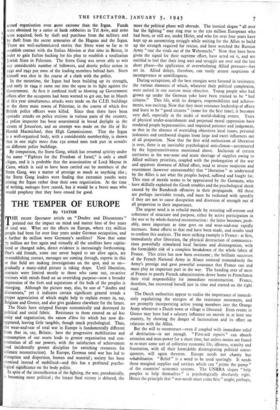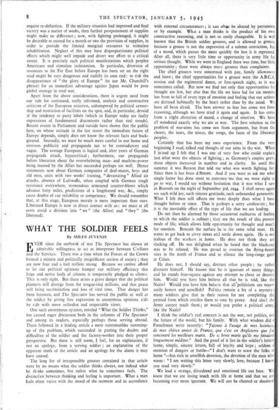THE TEMPER OF EUROPE
By VIATOR
THE recent Spectator article on " Doubts and Discontents " pointed out the impact on mind and matter here of five years of total war. What are the effects on Europe, where 125 million people had been for over four years under German occupation, and a further 8o million were Germany's satellites? Now that some 75 million are free again and virtually all the satellites have capitu- lated or changed sides, direct evidence is increasingly forthcoming. One's old friends, some one never hoped to see alive again, are re-establishing contact, messages are coming through, experts in this or that field are making investigations on the spot, and so on— gradually a many-sided picture is taking shape. Until liberation, contacts were limited mostly to those who came out, ex-active resisters with minds fixed on an overriding purpose—now a broader impression of the lives and aspirations of the bulk of the peoples is emerging. Although the picture may, also, be one of " doubts and discontents," yet it indicates certain significant general trends a proper appreciation of which might help to explain events in, say, Belgium and Greece, and also give guidance elsewhere for the future.
The Nazis have stripped Europe economically and destroyed its political and social fabric. Resistance to them created an ad hoc unity and organisation, the raison d'être for which has now dis- appeared, leaving little tangible, though much psychological. Thus,
the wear-and-tear of total war in Europe is fundamentally different from that in, say, Britain: here the progressive mobilisation and
consumption of our assets leads to greater organisation and con- centration of all our powers, with the satisfaction of achievement (and incidentally greater discipline for switching resources for ultimate reconstruction). In Europe, German total war has led to disruption and dispersion, human and material ; society has been atomised instead of mobilised—and this has a profound psycho- logical significance on the body politic.
In spite of the intensification of the fighting, the war, paradoxically, 1, becoming more political ; the longer final victory is delayed, the more the political phase will obtrude. The ironical slogan " all over bar the fighting " may ring true to the 120 million Europeans who had been, or still are, under Hitler, and who for over four years have kept up an unremitting struggle while waiting for the Allies to build up the strength required for rescue, and have watched the Russian Army " tear the vitals out of the Wehrmacht." Now they have been given the signal for their supreme effort, have acted on it, and are entitled to feel that their long wait and struggle are over and the last short phase—the application of overwhelming Allied pressure—has set in. Allied delays, therefore, can easily arouse suspicions of incompetence or unwillingness.
During occupation, all the best energies were focused in resistance, the various elements of which, whatever their political complexion, were united in one narrow main objective. Young people who had grown up under the German yoke have been trained to be " bad citizens." This life, with its dangers, responsibilities and achieve- ments, was exciting. Now that they must renounce leadership of affairs and learn to be " good citizens " (some for the first time), it becomes very dull, especially in the midst of world-shaking events. Years of physical under-nourishment and perpetual moral oppression have rendered people hypersensitive and impaired patience and judgement, so that in the absence of overriding objectives local issues, personal jealousies and catchword slogans loom large and exert influences out of all proportion. Now that the first wild enthusiasm of liberation is over, there is an inevitable psychological anti-climax—accentuated by the hypersensitiveness mentioned above. Inclusion of certain territories in the war-zone and acute shortage of supplies owing to Allied military priorities, coupled with the prolongation of the war and apparent slowness of Allied effort, tend to arouse suspicion and resentment (however unreasonable) that " liberation " as understood by the Allies is not what the peoples hoped, suffered and fought for. This state of morale seems to be appreciated by the Germans, who have skilfully exploited the Greek troubles and the psychological shock caused by the Rundstedt offensive in their propaganda. All these are perhaps inevitable trends, and must be reckoned with speedily if they are not to cause dissipation and diversion of strength out of all proportion to their importance.
The urgent need is to rebuild morale by restoring self-esteem and coherence of structure and purpose, either by active participation in the war or by whole-hearted reconstruction: the latter becomes, prob- ably, more important as time goes on and wear-and-tear rapidly increases. Some efforts to that end have been made, and results tend to confirm this analysis. The most striking example is France: at first, immediately after liberation, the physical destruction of communica- tions powerfully stimulated local factions and disintegration, with the formidable risk of a complete breakdown of the whole fabric of France. This crisis has now been overcome ; the brilliant successes of the French National Army in Alsace restored tremendously the Army's prestige and gave powerful assurance that France can and must play an important part in the war. The handing over of most of France to purely French administration drove home to Frenchmen their vital responsibility for immediate reconstruction. France, therefore, has recovered herself just in time and started on the right road.
The Dutch authorities appear to realise the importance of immedi- ately regularising the energies of the resistance movement, and are promptly incorporating active young members into the Orange Army whenever a Dutch town or village is liberated. Even events in Greece may have had a salutary influence on morale in at least one country, by showing the danger of factionalism and its effect on relations with the Allies.
But the will to reconstruct—even if coupled with immediate relief of destitution—is not enough. " First-aid repairs " can absorb attention and man-power for a short time, but unless means are found to re-start some sort of collective economic life, idleness, scarcity and frustration, with all their formidable disintegrating political conse- quences, will again threaten. Europe needs not charity but rehabilitation. " Relief " is a word to be used sparingly. It needs those marginal supplies and services which can " prime the pump " of the countries' economic systems. The UNRRA slogan " help peoples to help themselves" is psychologically absolutely right. Hence the principle that " war-needs must come first " might, perhaps, require re-definition. If the military situation had improved and final victory was a matter of weeks, then further postponement of supplies might make no difference ; now, with fighting prolonged, it might- be desirable to extend for a month or two the provision of supplies, in order to provide the limited marginal resources to stimulate rehabilitation. Neglect of this may have disproportionate political effects which might well impede and divert war effort to a critical extent. It is precisely such political manifestations which perplex Americans and stimulate isolationism. In particular, diversion of resources to the Far East before Europe has been set on the right road might be very dangerous and stultify its own end: to risk the disappearance of " the glory of Europe" (to use Mr. Churchill's phrase) for an immediate advantage against Japan would be poor global strategy in total war.
Apart from the above considerations, there is urgent need from our side for continued, really informed, analysis and constructive criticism of the European situation, unhampered by political censor- ship and restriction of facilities on the spot, and, in particular, devoid of the tendency to party labels (which in Europe today are faulty expressions of fundamental discontents rather than real trends). Recent events in Parliament and outside have shown that the public here, on whose attitude in the last resort the immediate future of Europe depends, simply does not know the relevant facts and back- ground. Secondly, we must be much more careful in our home and overseas publicity and propaganda not to be contradictory and vague. The average European is logical and, after years of German propaganda attack, hypercritical ; furthermore, our propaganda before liberation about the overwhelming man- and machine-power being massed by the Allies has succeeded perhaps too well. Hence statements now about German companies of deaf-mutes, boys and old men, units with two weeks' training, " devastating " Allied air attacks, absence of Luftwaffe, when coupled with German tough resistance everywhere, tremendous armoured counter-blows which advance forty miles, predictions of a lengthened war, &c., simply cause doubts of our reliability or competence. We should remember that, at this stage, European morale is more important than ours. Liberated Europe is now in direct contact with us: we must at all costs avoid a division into " we " (the Allies) and " they " (the liberated).



























 Previous page
Previous page